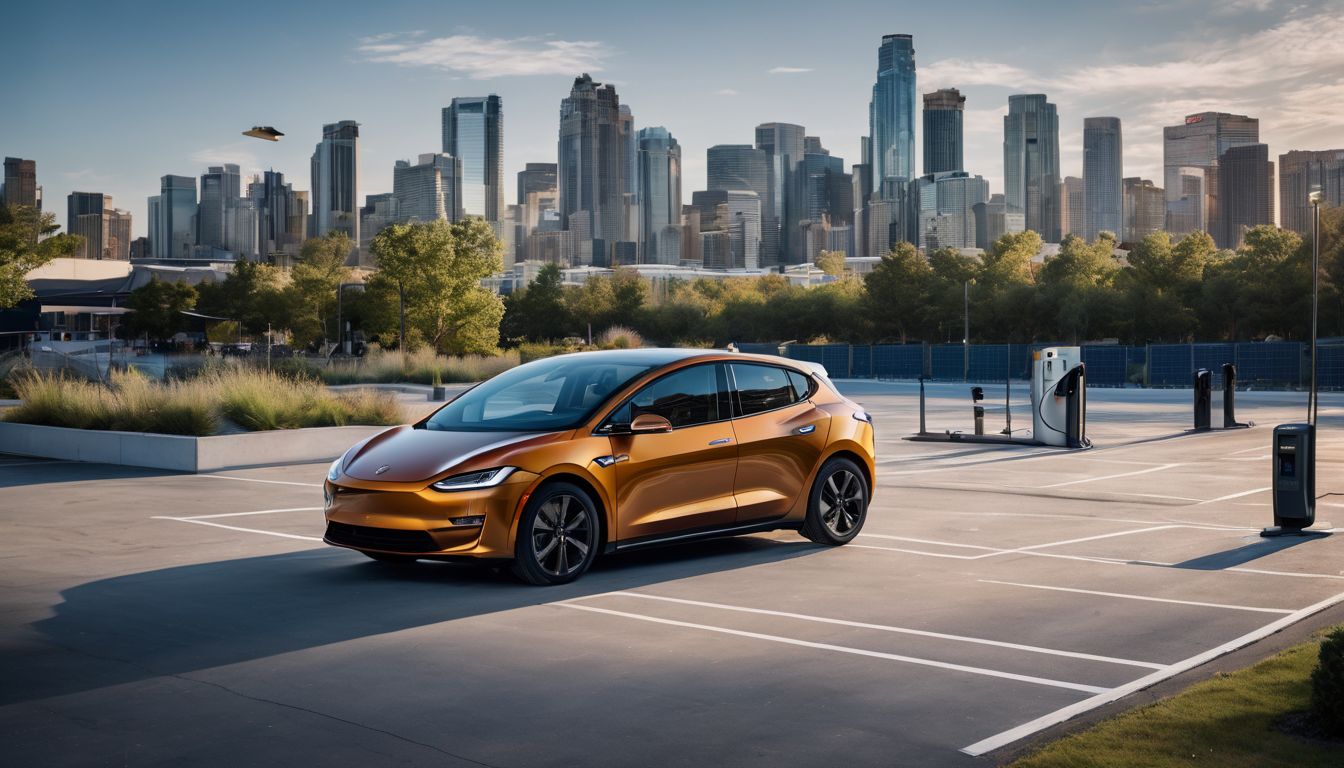As fuel prices reach for the skies, we’re collectively tightening our belts each time we head to fill up. We’ve all felt the sting of those climbing costs, and it’s a proper nuisance considering that transport is responsible for a hefty slice – almost one quarter – of global carbon emissions.
Yet there’s a glimmer of promise on the horizon with solar-powered cars. These forward-thinking machines could spell an end to our woes at the petrol station as well as do their bit for Mother Earth.
So why not bask in the glow of a brighter future behind the wheel? Carry on reading and let us illuminate the potential perks of solar-charged motoring!
Key Takeaways
- Solar – powered cars are electric vehicles that use sunlight to generate power, leading to zero emissions and a reduced carbon footprint, contributing to the fight against climate change.
- Adopting solar – powered vehicles can lead to significant savings as they harness free energy from the sun, lowering fuel costs and reducing maintenance needs due to their simpler design.
- Innovations like solar roofs and tonneau covers on cars extend their range by improving energy efficiency; advancements in technology continually enhance the performance and practicality of these eco-friendly vehicles.
- The trend towards using renewable energies is shaping the future of transportation with governmental incentives promoting research development and consumers’ increasing interest in sustainable living.
- Solar-powered car racing events showcase the capabilities of this technology highlighting its potential for high-performance applications while driving forward innovation within the automotive sector.
What are Solar-Powered Cars?
Solar-powered cars are vehicles that use solar panels to convert sunlight into electricity, which is then used to power the vehicle’s electric motor. These cars harness clean and renewable energy from the sun to reduce reliance on fossil fuels.
Definition
Solar-powered cars harness clean energy directly from the sun. They have solar panels on their surface that convert sunlight into electrical power to run the vehicle. This innovative technology makes them a type of electric vehicle with a renewable twist, relying on sustainable transportation methods and offering zero-emissions travel.
These vehicles are more than just a concept; they’re real-world solutions for reducing our carbon footprint. Our journey towards green transportation includes understanding how these progressive machines operate.
Let’s dive into the workings of solar-powered cars and shed light on their main components in the following section.
How do they work?
- Photovoltaic cells installed onto the car’s surface absorb sunlight and convert it into electricity.
- This electricity is then stored in a battery pack for later use, ensuring continuous power even when the sun isn’t shining.
- The stored energy is used to power an electric motor, which drives the wheels of the car, allowing it to move forward.
- Some solar cars also incorporate regenerative braking systems, which capture and convert kinetic energy during braking into additional electrical power for the battery.
- Advanced designs integrate lightweight materials and aerodynamics to optimise efficiency and range.
- Solar panels can be incorporated into various parts of the vehicle, like roofs or tonneau covers, enhancing energy capture without compromising style or performance.
Main components
Transitioning from how solar-powered cars work, let’s delve into their main components. Solar-powered cars primarily consist of photovoltaic cells, which convert sunlight into electricity to power the vehicle.
These cells are typically integrated into the car’s body to capture as much sunlight as possible. Additionally, solar charge controllers manage the voltage and current coming from the solar panels to ensure a safe and efficient charging process for the car’s battery.
Finally, energy storage systems such as rechargeable batteries or supercapacitors store excess energy generated by the photovoltaic cells, allowing for continuous operation even when sunlight is unavailable.
Benefits of Solar-Powered Cars
Solar-powered cars offer various benefits, including being environmentally-friendly, cost-effective, and low maintenance. They also contribute to reducing noise pollution and are part of the growing renewable energy trend.
Environmentally-friendly
Solar-powered cars are environmentally-friendly, emitting zero emissions and reducing our carbon footprint. By harnessing clean solar power, these vehicles contribute to the reduction of air pollution and help combat climate change.
They also minimise reliance on fossil fuels, promoting the use of renewable energy sources for transportation, thus aligning with our sustainable conservation efforts.
In addition to zero emissions and reduced air pollution, solar-powered cars play a significant role in preserving the environment by lessening our dependence on finite resources like oil.
Cost-effective
Solar-powered cars offer a compelling cost-effective solution for environmentally conscious consumers. By harnessing energy from the sun, these vehicles significantly reduce reliance on traditional fuel sources, leading to substantial savings in the long run.
With solar charging stations and advancements in solar technology, the overall cost of ownership and operation is steadily decreasing. This approach not only aligns with the principles of clean energy but also provides a viable financial advantage for those seeking sustainable transport options.
The integration of solar power into electric vehicles represents an innovative step towards achieving greater energy efficiency while promoting cleaner air and reducing carbon footprints.
Noise pollution reduction
Solar-powered cars offer the significant benefit of reducing noise pollution, creating a quieter and more peaceful urban environment. The integration of electric motors in solar-powered vehicles eliminates the loud combustion engine noises traditionally associated with conventional cars, leading to a noticeable reduction in overall traffic noise levels.
This makes solar-powered cars an appealing option for individuals seeking to contribute positively towards a quieter and more serene environment, aligning with our commitment to supporting conservation and environmental sustainability.
Moreover, by embracing solar-powered cars as an alternative mode of transportation, we actively decrease reliance on fossil fuels and ultimately reduce harmful emissions that contribute to noise pollution.
Low maintenance
Transitioning from noise pollution reduction to low maintenance, we find that solar-powered cars require minimal upkeep, making them a practical and hassle-free transportation option for environmentally conscious individuals.
With fewer moving parts and no reliance on traditional fuel sources, these vehicles have reduced maintenance needs.
Solar-powered cars offer a sustainable solution to transportation that requires less frequent servicing and repair work, contributing to cost savings in the long run. This aligns with the overall goal of supporting conservation and environmental efforts while enjoying the benefits of clean energy sources and alternative fuel vehicles.
Advancements in Solar-Powered Car Technology
Solar-powered cars are seeing advancements in technology, such as the integration of solar roofs and tonneau covers, race car prototypes, and start-up companies entering the field.
There’s also a growing trend towards integrating solar energy into electric vehicles (EVs).
Solar roofs
Solar roofs are an innovative feature that harnesses the power of the sun to generate electricity for a vehicle. These specially designed solar panels are integrated into the roof of a car, absorbing sunlight and converting it into energy.
The generated power can be used to supplement the vehicle’s main battery, extending its range and reducing the reliance on charging stations or traditional fuel sources. This advancement in technology not only promotes sustainable energy use but also contributes to reduced carbon emissions, making it a significant step towards cleaner transportation solutions.
By incorporating solar roofs into electric vehicles (EVs), manufacturers are enhancing their energy efficiency and reducing their environmental impact. With this cutting-edge addition, EVs become even more attractive to environmentally conscious consumers who seek greener alternatives for personal transport while supporting conservation efforts.
Solar-powered tonneau covers
Solar-powered tonneau covers are a game-changer for solar-powered cars. These innovative covers harness the sun’s energy, providing an additional source of power for electric vehicles.
By capturing sunlight and converting it into electricity, these tonneau covers help to extend the range of solar-powered cars, making them more practical and efficient for everyday use.
Additionally, the integration of solar panels into these covers contributes to reducing environmental impact by utilising clean and renewable energy sources while allowing drivers to charge their vehicles on-the-go.
Race car prototypes
Race car prototypes using solar power have been developed to showcase the potential of this technology in high-performance vehicles. These prototypes aim to demonstrate that solar-powered cars can be both fast and efficient, challenging the notion that renewable energy is only suitable for slower, less powerful vehicles.
Cutting-edge advancements in aerodynamics and lightweight materials are being integrated into these race car prototypes, pushing the boundaries of what is possible with solar-powered transportation.
These innovative projects not only serve as a testament to the capabilities of solar energy but also inspire further development in the automotive industry towards more sustainable options.
Start-up companies in the field
Start-up companies are driving innovation in the field of solar-powered cars, focusing on developing cutting-edge technology to harness solar energy for vehicle use. These companies are committed to creating efficient and environmentally friendly vehicles that align with the growing renewable energy trend.
By integrating solar roofs and tonneau covers into their designs, these start-ups aim to provide consumers with practical and sustainable transportation options while reducing their carbon footprint.
These innovative ventures are contributing to the advancement of solar-powered car technology, paving the way for mainstream adoption of energy-efficient vehicles. With a focus on environmental benefits and cost-effectiveness, these start-up companies play a crucial role in revolutionising the automotive industry towards sustainability.
Integration of solar energy into EVs
Electric vehicles (EVs) are increasingly incorporating solar energy technology to enhance their sustainability and reduce reliance on traditional power sources. Solar panels integrated into the body of EVs capture sunlight and convert it into electricity, which can be used to power the vehicle’s systems or charge its battery.
This integration allows EVs to harness renewable energy while reducing their environmental impact and operating costs. As environmentally conscious individuals, supporting conservation and environmental sustainability, this advancement in technology presents a promising opportunity to further embrace clean transportation options.
Solar-powered EVs possess the potential for increased energy efficiency and reduced carbon emissions, aligning with our commitment to promoting eco-friendly practices. By leveraging solar energy as a supplementary power source, electric cars can contribute positively towards addressing climate change while offering a practical solution for sustainable mobility.
The Future of Solar-Powered Cars
As the technology for solar-powered cars continues to advance, there is a potential for mainstream adoption and integration of solar energy into electric vehicles. Solar-powered car racing and government support are also contributing to the future growth of this renewable energy trend.
Potential for mainstream adoption
Solar-powered cars have the potential to become mainstream transportation options as renewable energy trends continue to gain traction. With advancements in technology and increasing awareness of environmental conservation, more individuals are considering the benefits of solar-powered vehicles.
The integration of solar energy into electric vehicle (EV) designs is a promising development that could lead to wider adoption among environmentally conscious consumers, offering an alternative that aligns with their values and promotes sustainable living.
As the interest in eco-friendly transportation grows, so does the potential for widespread acceptance of solar-powered cars as viable alternatives to traditional fossil fuel-based vehicles.
Solar-powered car racing
Solar-powered car racing has gained popularity as a platform for showcasing the potential and performance of solar energy in the automotive industry. It provides an exciting opportunity to demonstrate the capability of solar-powered cars, promoting innovation and pushing the boundaries of sustainable transportation.
As environmentally conscious individuals, supporting conservation and renewable energy trends, observing and participating in solar-powered car racing can inspire confidence in the future adoption of this eco-friendly technology.
Racing events serve as a dynamic platform for testing and advancing solar-powered vehicle technology. The competitive nature fosters rapid development, ultimately contributing to more efficient and practical solar-powered cars on our roads.
Government support
Governments around the world are increasingly recognising the importance of renewable energy sources, including solar power for transportation. Incentives such as tax credits and rebates encourage individuals and businesses to invest in solar-powered vehicles.
Additionally, many governments are investing in research and development to improve solar technology and infrastructure, making it easier for consumers to embrace this eco-friendly alternative.
These efforts signal a promising future for widespread adoption of solar-powered cars.
Growing renewable energy trend
As environmentally conscious individuals, we are witnessing a significant growth in the renewable energy trend. More and more people are embracing solar power as a viable and sustainable option for their daily energy needs.
This shift towards solar power is not only evident in residential and commercial applications but also in the transportation sector, with an increasing number of vehicles being powered by solar energy.
The growing renewable energy trend is creating exciting opportunities for us to reduce our carbon footprint while promoting a cleaner and greener future.
Looking towards the future, it’s clear that the demand for renewable energy sources such as solar power will continue to rise. Embracing this trend can lead us toward a more sustainable way of living and enable us to make positive contributions to environmental conservation efforts worldwide.
Conclusion
Solar-powered cars offer a promising alternative for environmentally conscious individuals looking to reduce their carbon footprint. These energy-efficient vehicles are not only cost-effective but also contribute to noise pollution reduction and require low maintenance, making them an attractive option for those supporting conservation and environmental initiatives.
With advancements in solar-powered car technology, such as the integration of solar roofs and tonneau covers, as well as the development of race car prototypes, the future looks bright for mainstream adoption.
Government support and the growing trend towards renewable energy further bolster the potential growth of solar-powered cars in the automotive industry.
The advantages of solar-powered cars align with our commitment to conservation and environmental protection by offering a sustainable transportation solution that moves away from traditional fossil fuel dependency.
FAQs
1. Why are solar-powered cars considered energy-efficient vehicles?
Solar-powered cars are energy-efficient because they use the sun’s power to charge their batteries, reducing reliance on fossil fuels and saving energy.
2. What makes solar-powered cars advantageous for drivers?
These cars offer advantages like lower running costs since sunlight is free, and they also produce less pollution compared to regular vehicles.
3. Can solar-powered cars help the environment?
Yes, by using renewable solar energy instead of petrol or diesel, these vehicles cut down on harmful emissions and help protect our environment.
4. Are there cost benefits to owning a solar-powered car?
Owning a solar-powered car can save money over time with fewer expenses on fuel and potential tax incentives for driving an eco-friendly vehicle.





